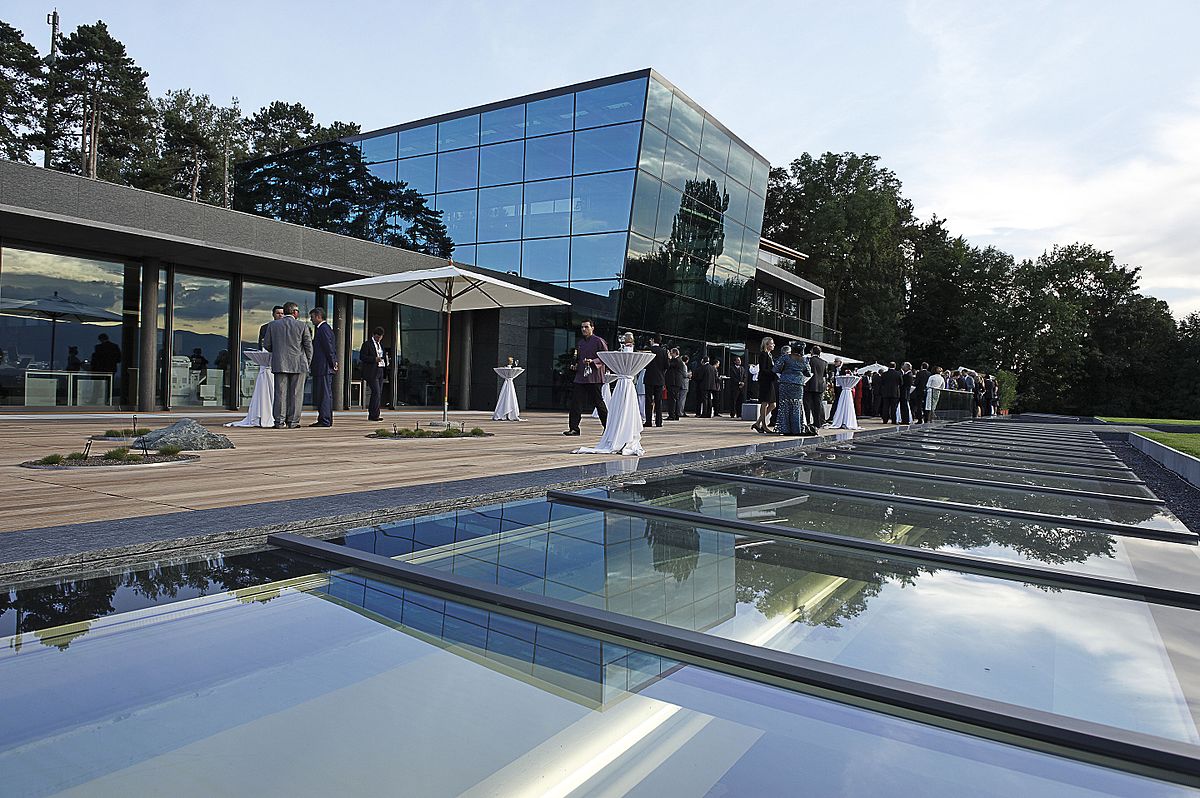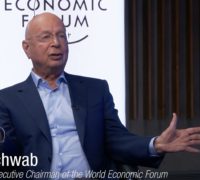‘You have to bring hearts and minds with you’
Rio Tinto CEO, Jakob Stausholm emphasizes relationship-building and empathy to restore Rio Tinto's social license and guide its decarbonization efforts....
YouTube
7 September 2021 in CEO Dialogue Series
Klaus Schwab discusses the urgent need for stakeholders to collaborate to combat the climate emergency, cope with technological change and address skills gaps in an interview with Jean-François Manzoni, President of IMD...
Klaus Schwab believes shifting consumer preferences and a desire by talented staff to work at responsible firms means serving all stakeholders is in the self-interest of companies if they want to boost their bottom line.
The founder of the World Economic Forum (WEF) first wrote about stakeholder capitalism — a decision by companies to not only maximise short-term profit but to invest in their staff and communities to succeed in the long run — half a century ago.
But he believes the age of stakeholder capitalism is finally dawning with companies realising it can increase long-terms profits, as consumers shop more sustainably, skilled workers seek out jobs at responsible corporations and investors pour money into firms who take care of their people and the planet.
“For a sophisticated company, a forward-looking company, I would say it is a must to move from shareholder prioritization to an integrated concept of stakeholder capitalism,” says Schwab, who founded the European Management Forum, which later became the WEF, in 1971 as a place where stakeholders ranging from business leaders and politicians to environmentalists and trade unionists could convene to help solve complex problems.
With governments consumed by short-term crises failing to address long-term challenges, employees and customers are now assuming the role of substitute regulators by influencing corporate behaviour, Schwab says.
He cites the example of Danish shipping giant Maersk which last month ordered eight vessels that will be powered by carbon-neutral methanol, at a price premium of 15%, in response to customer demands for greener transportation to cut emissions in their supply chain. The move will help Maersk save CO2 emissions of around 1 million tonnes per year.
One challenge is the lack of universal measurement systems for environmental, social, and governance (ESG) reporting which makes it hard to compare compliance across companies. The WEF sought to address this by teaming up with the Bank of America and the Big Four audit firms in 2020 to create a set of universal ESG metrics to align standards and make cases of greenwashing easier to spot.
Just as it took time to develop a financial standard to compare the profitability of corporations, Schwab believes it will take a similar process to integrate ESG metrics into company reporting.

“I am very confident that victory will be declared in the long term for stakeholder capitalism”- Klaus Schwab
Schwab sees a new generation of shareholders as driving the move towards stakeholder capitalism. For example, tiny activist hedge fund Engine No. 1 booted out three board directors at Exxon Mobil Corp earlier this year in a bid to get the oil major to develop a plan to address climate change.
“I am very confident that victory will be declared in the long term for stakeholder capitalism,” he says.
But for this to happen, society will have to learn to work together again, says Schwab. “We have become more egocentric; cooperation in an egocentric world is more difficult.”
Schwab says he believes it is now more important than ever to include disenfranchised voices when trying to solve the complex challenges facing the world, such as the climate emergency, by creating co-ownership and ensuring support from the start.
During the early days of the WEF, Schwab who was born in Ravensburg, Germany and trained as a mechanical engineer, sat on the boards of several German companies and became familiar with the notion of co-determination, which allows workers to elect trade union representatives to supervisory boards. While this might lead to more resistance and slow down decision-making, it means you have more support in the long run, he says.
Another challenge is to persuade citizens that short-term sacrifices are needed for the long-term benefit of society, as is the case if the world is going to achieve the goal of limiting global warming to between 1.5 and 2 degrees Celsius to stave off the most catastrophic consequences of climate change. “The problem is that sacrifices are not equally distributed and the benefit is not equally distributed,” he says.
As well as combatting the climate emergency, Schwab sees the need for stakeholder capitalism to help address urgent skills gaps and inequality in a rapidly changing world where new technologies like Artificial Intelligence, cryptocurrencies and quantum computing are transforming society.
To future-proof the workforce, business needs to take the lead by providing hands-on training in digital skills. The WEF has also launched the Reskilling Revolution project which aims to provide one billion people with new skills that fit with the Fourth Industrial Revolution.
Asked about succession, Schwab, 83, says he still feels mentally and physically capable of carrying out his role as executive chairman at the WEF. He keeps fit by swimming for 40 minutes every morning and stays mentally agile by reading up on his interests and trying to concentrate on the positive side of life.
While traditionally, successors were groomed over many years and appointed based on their experience, Schwab believes the criteria for the next generation of leaders have changed.
“Today experience is less important; what is much more important is that you are in line with the times, you are forward-orientated, you are a fast learner.”

World Economic Forum Founder, and Executive Chairman
“Klaus Schwab is Founder and Executive Chairman of the World Economic Forum, based in Geneva, Switzerland. He founded the Forum to promote collaboration among the foremost politics and culture in 1971. This was the same year in which he published a book arguing that the management of modern companies must serve all parts of society not just shareholders.”
24 September 2024 • by Jean-François Manzoni in CEO Dialogue Series • 7 min read
Rio Tinto CEO, Jakob Stausholm emphasizes relationship-building and empathy to restore Rio Tinto's social license and guide its decarbonization efforts....
20 August 2024 in CEO Dialogue Series • 6 min read
CEO of International SOS Arnaud Vaissié explains to IMD President Jean-François Manzoni how the business has survived 40 years by overcoming obstacles like COVID-19 and navigating financial crises....
18 June 2024 • by Jean-François Manzoni in CEO Dialogue Series • 9 min read • 
Margherita Della Valle tells IMD President Jean-François Manzoni how she is delivering radical change to reenergize Vodafone and paving the way for greater diversity in leadership ...
21 May 2024 in CEO Dialogue Series • 11 min read • 
Lars Fruergaard Jørgensen, CEO of the company which makes game-changing obesity drugs Ozempic and Wegovy, explains how its culture and long-term view underpin its recent turnaround. ...
30 April 2024 in CEO Dialogue Series • 9 min read
The RWE CEO tells Jean-François Manzoni how he is reshaping the power company to drive the energy transition and why leaders need to always keep something in the tank to remain resilient....
26 March 2024 in CEO Dialogue Series • 9 min read • 
A year into the job, Marco Arcelli, CEO of ACWA Power, tells IMD President Jean-François Manzoni how the Saudi company plans to triple assets to $250 billion in six years by expanding...
27 February 2024 in CEO Dialogue Series • 9 min read • 
Henkel CEO Carsten Knobel tells IMD President Jean-François Manzoni why he has remained laser focused on implementing its purposeful growth agenda and why the company decided to exit Russia. ...
23 January 2024 in CEO Dialogue Series • 9 min read
Anticipating rising raw material costs, Tata Steel’s CEO & Managing Director TV Narendran tells IMD President Jean-François Manzoni how he introduced a change management process to instill a culture of future readiness...
12 December 2023 in CEO Dialogue Series • 8 min read
Jessica Sibley, CEO of TIME, explains to Jean-François Manzoni how she is transforming the 100-year-old media brand into a company that can remain relevant in the digital age....
14 November 2023 in CEO Dialogue Series • 9 min read • 
Henrik Andersen discusses with IMD President Jean-François Manzoni the challenges of navigating supply chain disruptions and soaring raw material costs over the past three years, and why he changed the wind farm...
Explore first person business intelligence from top minds curated for a global executive audience